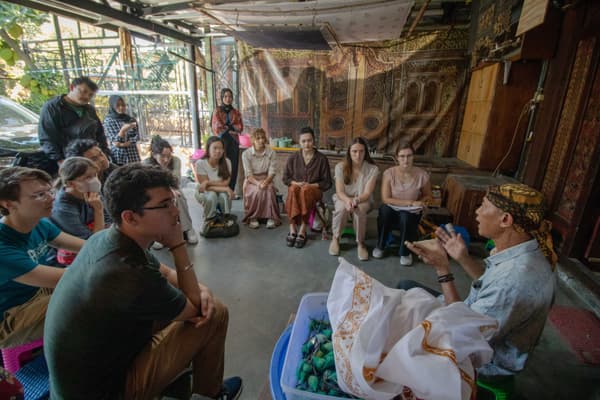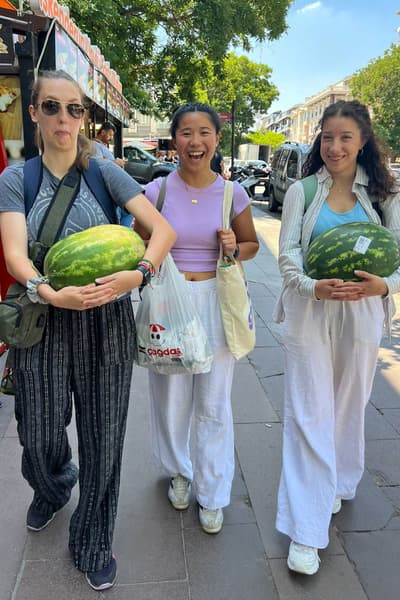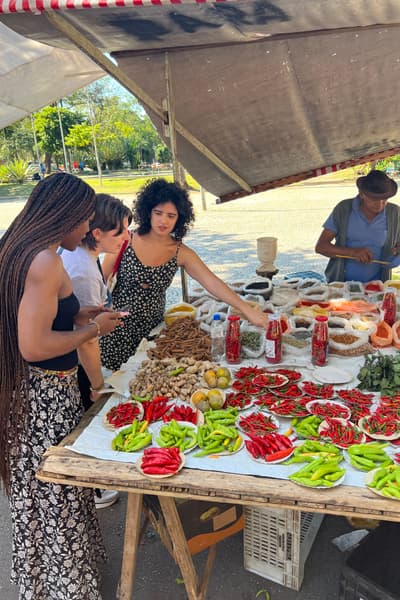Daily Life
On-site Orientation
Upon arrival in the host country or location, CLS participants are met by local staff. Information about what to expect upon arrival is provided to participants prior to departure. After arriving in the host community, students participate in an on-site orientation prepared by local staff in conjunction with the Resident Director. The on-site orientation covers important information such as cultural norms and expectations, academics, housing and meals, health and safety, emergency procedures, and site-specific policies. On-site orientation typically lasts two to three days. Classes usually begin on the second or third day after arrival.
Passports
Finalists are urged to review the section on passport requirements for participation in the CLS Program in this guide. Please note that while on program, CLS students may be required by local authorities to carry and be prepared to present either their original U.S. passport or a copy of their U.S. passport. Specific requirements about this are covered as part of the pre-program orientation.
Participants should be vigilant about protecting their U.S. passport during the program. If a passport is lost, stolen, or damaged during the program, the participant should contact a CLS staff member as soon as possible to report it. CLS staff will provide support in contacting the nearest U.S. embassy or consulate to assist the participant in obtaining a replacement passport. Participants should be aware that the cost of obtaining a replacement passport is not covered by the CLS Program, and loss or damage to a passport may impact the participant’s ability to depart the host country as planned.
Cell Phones
Participants are required to ensure that they have a functioning cell phone with them at all times and to respond promptly to inquiries from program staff. Most CLS participants choose to bring their own personal cell phones with them to use on the program. Participants who are not able to or prefer not to use their own cell phone are provided with a program-issued cell phone for use during the program. Program-issued phones are sourced locally and typically have more limited capabilities than those in common usage in the U.S.
Participants should enter the Resident Director’s number and at least two other local staff members’ numbers into the phone to avoid searching for phone numbers during an emergency. If a participant’s cell phone stops working at any point during the program, they should inform the Resident Director or another program staff member so that a solution can be implemented as soon as possible to ensure the participant has reliable communication.
Daily Schedule
Participants typically follow a consistent schedule while on program which includes commuting to and from the host institute, participating in classes, attending cultural activities, doing homework, and spending time with Language Partners and host families or roommates. Because CLS is a group-based program, students can expect to spend a great deal of time each day with their CLS peers. Participants often find that they have less flexibility in their daily schedule than they are accustomed to. Participants are encouraged to pursue their own interests in their host community but must plan carefully in order to do so, considering the demands of the program schedule.

Participants learning about batik in Indonesia.
Housing
CLS Program housing arrangements are a valuable opportunity to learn about the daily life of people in the host community. Participants’ housing on program varies by site; at some program locations, participants live with host families, while at others they live in an apartment or dormitory with CLS or local roommate(s). Participants are required to live with their assigned host family or roommate(s) throughout the CLS Program and to speak the CLS language with them.
CLS Program staff provide information about housing type during pre-program orientation in the spring. Students can expect to receive information about their particular host families/roommates a few days before departure. After students arrive at the program site, host institute staff introduce CLS students and to their host family or roommate(s). CLS staff work with host families and local roommate(s) to set expectations about the CLS Program, participants’ schedules, and their goals in learning the CLS language. Host families and roommate(s) are interested in getting to know students, sharing their traditions and daily lives, and learning about the United States. For their part, participants are expected to treat their host family members and roommate(s) with respect and consideration. Participants should recognize the effort that their host family or roommate(s) put into hosting them and remember their own role as citizen ambassadors when interacting with their host family or roommate(s). If a participant has needs such as a specific diet or quiet time at home to study, they are expected to communicate their needs to their host family/roommate(s) in a respectful manner and collaborate with them to find a solution to problems or misunderstandings that may arise.
Participants are often surprised by social and infrastructure differences between the U.S. and their housing at the program site. For example, previous students at many CLS sites report that cigarette smoke is significantly more common than they are used to in the U.S. The length and firmness of beds, the absence of air conditioning, and the periodic cessation of hot water are also commonly reported as discomforts of daily life at many CLS host communities. While these circumstances may feel uncomfortable to participants, experiencing them offers first-hand insight into the host community. If a participant has a concern about their housing arrangements or their relationship with their host family/roommate(s), they should speak with their Resident Director and/or institute staff so that they can work together to find a solution.
Commuting
Most participants need to commute each day from program housing to campus using public transportation. The CLS stipend includes funds to help offset the costs of commuting. Information about transportation in the host community is included as part of pre-program and on-site orientation. Learning to use public transportation in a new community with limited language skills can be a frustrating and humbling experience, but learning to do so allows students to understand and navigate their host community independently. These same skills can later be applied to learning to navigate other new cities around the world. Students are encouraged to ask their host families or roommate(s) for advice on the best transportation method(s) and route(s) to get to campus and to keep transportation safety tips in mind when commuting.
Meals
Learning about the culinary traditions of their host community is an aspect of daily life that many CLS alumni remember fondly. At some CLS program sites where students participate in home stays, meals often provide a key time for connection and conversation practice. Some students even seek out the opportunity to learn how to cook local dishes with their host family, or to share a favorite dish from home with their hosts. In locations where students live with host families, hosts typically provide participants with certain meals, such as breakfast and dinner on weekdays and breakfast, lunch, and dinner on weekends, although specific arrangements vary by site.
At some program sites, students receive lunch at their host institute, and at other program sites, participants are responsible for arranging all of their own meals. The CLS stipend includes funds to assist students with the cost of meals not provided by their host families or the host institution. Participants are encouraged to ask their host families, roommate(s), Language Partner(s), or institute staff for recommendations on reasonably priced restaurants, cafes, markets, and grocery stores in the host community.

CLS Turkish students carry groceries in Ankara.
Language Learning
The CLS Program offers a chance to focus exclusively on language learning in an immersion environment among fellow scholars who are equally as excited by the opportunity. The combination of structured language learning and many informal opportunities within an immersion environment is powerful—CLS participants make tremendous progress in just eight weeks. Program alumni are often surprised at how much their language skills have grown, and how much more confident they feel using their CLS language and navigating new environments.
Gaining that level of confidence does not come easy. Speaking a different language can feel exhausting at times, and frequently comes with feelings of frustration, a sense that language skills are backsliding (they are not!), or feelings of embarrassment and discomfort. This happens even for those who have studied abroad, taken years of language coursework, and for those who speak their CLS language at home with family. But with constant practice and a solid foundation of coursework, students make tremendous language gains while on program. Visit the CLS Program website to learn more about the significant language gains made by participants on the CLS Program.
The Language Policy
To support all students to make the largest language gains possible, CLS students commit to a language policy, agreeing to speak with faculty and staff, host families and/or roommates, Language Partners, peers, and other program affiliates in their CLS language. This helps establish a community of learners who are all working towards the shared goals of improving their command of the language and who can motivate each other to keep making progress, even during tiring days or when confidence is low.
This community includes students across all levels of language learning, from those at the beginning level to those with the most advanced level skills. Beginning learners can draw on more experienced speakers to discover new words and ask for help understanding phrases. Intermediate learners are poised to take in large amounts of vocabulary and apply what they have already learned in the classroom to real life situations. Advanced learners, who have often gotten the hang of saying things one way, find they may need to come up with new and creative ways to get ideas across in their CLS language when speaking with less experienced learners and interlocutors from different backgrounds. Linguists term this circumlocution, and it is a great way to build skills for adjusting communication to fit the needs of different audiences when trying to express an opinion or debate a topic.
Many successful language programs focus on using the language of study in the classroom—it builds up skills quickly, helping learners gain listening strategies and build vocabulary. Using the language outside of the classroom also has benefits, increasing the amount of time participants spend applying the language in real-world situations.
The CLS language policy serves as an agreement between all participants and identifies specific places and times when students are asked to use their CLS language which include the following:
- In classes (with a short exception for beginners at the start of the program, please see "Notes for Beginners" below)
- With host families, roommates and Language Partners
- On program excursions and during other program activities
- On campus, as a courtesy to members of the host community
The language policy also provides encouragement and accountability and helps to sustain an immersion environment for participants. Adherence to the language policy helps students continue to make progress and push through the ups and downs that come with language learning.
There are, however, several important limits to the language policy:
- During emergencies, as well as when expressing concerns about health, safety and well being
- During orientation sessions and security briefings,
- During the weekly CLS meeting led by the Resident Director
- When a student has questions about the program or program policies or wants to discuss strategies for navigating the host community and environment.
If a student needs to speak with a staff member in English, they should clearly indicate that.
Participants are encouraged to speak their CLS language in as many situations as possible. To maximize the opportunity to improve command of the language, it is recommended that participants reduce the amount of time spent using languages other than the CLS language, even in situations not listed above. However, there is no policy against speaking with friends and family outside of program activities.

Portuguese participants learn about Brazilian ingredients from their Language Partner.
Notes for Beginners
Beginners have a grace period before the language policy sets in. In the first two weeks of the program, beginners are not required to speak the CLS language in the same way that students with previous experience are and may speak some English. However, during this period beginners should be aware and respectful that students at other levels are expected to maintain the language policy, and it is a good time to focus on building vocabulary and key phrases.
Teachers, Language Partners, host families, and other program affiliates are not required to speak English and are expected use your CLS language to facilitate language learning, including with beginners, as part of the immersion experience.
Participants should keep in mind that the challenges they face in communicating in their CLS language with host family members, Language Partners, cultural tour guides, etc. are language learning opportunities that are an intentional part of the program structure. Navigating these interactions outside one’s comfort zone in the CLS language helps participants develop essential language skills. Moving forward productively in language learning often calls for being forgiving of oneself, but also maintaining persistence and being willing to reach out to teachers, the RD, and peers to ask for advice and practice a conversation in advance.
Many past participants have faced occasional challenges in understanding teachers, Language Partners, host family members or roommates, and other members of the host community. Many CLS alumni have anecdotes of showing up at the wrong place or time for a Language Partner meeting, misunderstanding a host family’s request, or having to ask a teacher to repeat an assignment multiple times. These alumni report that they worked through the frustration of these experiences and gained enhanced language skills and cultural knowledge. Speak about challenging situations with the Resident Director and fellow CLS participants. They will be able to provide cultural context and brainstorm ways to manage future interactions.
“I would strongly recommend learning the basics before taking the placement test so you can make the most progress while you are there. While it is perfectly okay to be a complete beginner, it makes it a little less stressful and perhaps provides more opportunities to engage with the culture/community early on if you learn the basics of the language before you travel.”
- CLS 2023 Indonesian Participant


